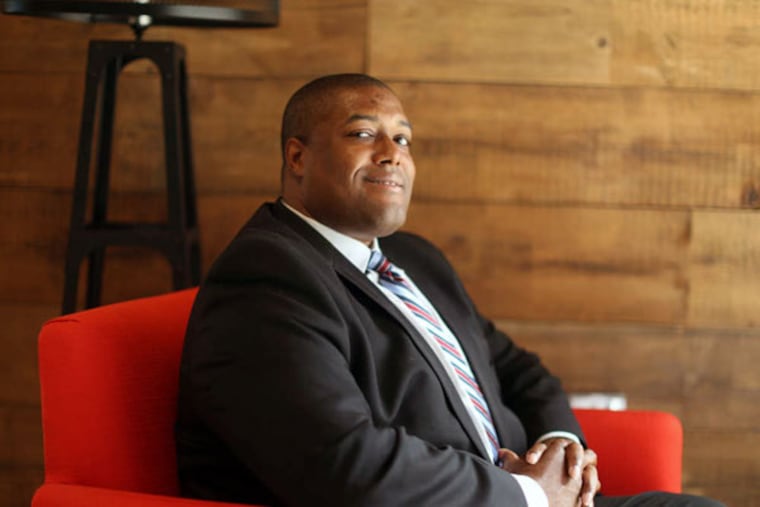
When not organizing TED talks or teaching aspiring MBAs at Wilmington University, W. Daniel Young is investing for himself and his clients. We caught up with him on campus, to ask how he invests for his own retirement and why he switched from a national firm to a small, fee-only investment shop.
Young believes in diversifying - both in his portfolio and in his personal life. He teaches entrepreneurship and practices what he teaches: investing in land, private real-estate deals, and Internet start-ups founded by his students.
On money management, he co-founded Civitas Partners, a wealth-management financial-services firm in Wilmington. Young and his partner, Gregory Coverdale, are certified financial planners, meaning they have a fiduciary duty to pick suitable investments for their clients.
After a decade at Ameriprise Financial, once a division of American Express, Young left to join forces with Coverdale in 2011. They merged practices and now oversee about $10 million in assets held in custody at TD Ameritrade.
"I lived through two market crashes, in 2000 and 2008. And after the 2008 financial crisis, Ameriprise was actually well-positioned because they sell both investments and insurance. They remained profitable when other firms failed. But there was pressure to focus on high-net-worth clients. My clients are family and friends; they weren't in the 1 percent. My clients held assets in 401(k) plans and small retirement accounts," Young recalls.
He wanted to focus more on "servicing people I cared about and financial planning, and less on annuities and life insurance. I felt like they weren't the best things for my clients. I felt some pressure to sell those. For what I wanted to do, which was a hybrid of teaching and wealth management, I want to spend time with clients. So I changed over to a fee-only practice without commissions" on investment products, he says.
His investment style is more straightforward now, Young says. "About 50 percent of my portfolio is in exchange-traded funds, 25 percent in individual stocks, and 25 percent in cash. I'm always looking for real estate, so I keep money in cash to buy or to fix up old properties."
Why exchange-traded funds?
"They're low-cost, come in a number of sectors, and are more tax-efficient than mutual funds. My style is very different than 10 years ago, when I had more money in actively managed funds," which tend to charge more in fees, he notes.
"I've become sensitive to costs over two recessionary markets and as an independent adviser. With ETFs and index funds, I won't beat the market, but I'm saving money on fees and taxes over time. I've become more conservative," he adds. "It's not how much I make but how much I keep, so I minimize taxes and costs rather than aim for astronomical returns."
He owns the Vanguard Russell 1000 ETF (VONE); Vanguard Energy Index fund (VDE); Schwab Small Cap ETF (SCHA). He recently sold iShares Core Emerging market (IEMG) after poor performance. Young also owns a handful of individual stocks, holding for many years. For instance, he bought Apple in 1999 while still in graduate school, at $26 a share. He owns shares of Google and Facebook, "things I know a lot about and use all the time."
With Facebook, Young waited well after the initial public offering. "As an investor and marketing professor, I saw how much press there was surrounding the IPO; I knew the stock would be incredibly overpriced. At the time, I didn't see a strong revenue model. It opened at $41, and I bought a few months later at $29."
Last year, he sold Visa after a multiyear holding period. "I made money on it, but I needed the cash for other investments," he says.
Young is 39, married, and has four children under 8. He has many years before retirement. He has a small pension plan with TIAA-CREF from working at Wilmington University. (He got bachelor's and master's degrees from the University of Delaware and his doctorate in marketing from Temple University.) In his TIAA-CREF portfolio, which he has owned for three years, he holds a CREF mutual fund.
His wife, Kelly, 36, is an elementary school teacher who plans on retiring by 60. Both likely will file early for Social Security, he says.
"I would likely take Social Security earlier and reinvest those funds myself, whereas for most people that's not the case. Since I do financial planning I'd rather invest it."
It's interesting that Young no longer owns any fixed income or bonds in his personal portfolio.
"Right now, owning bonds can be tricky. Interest rates have gotten so low that any uptick [in rates] will lower the value of the underlying bonds. Economically, it makes no sense to me."
For clients who want income, he buys individual corporate bonds such as General Electric or utilities bonds. He admits that "savers and people who need income have very few options right now."